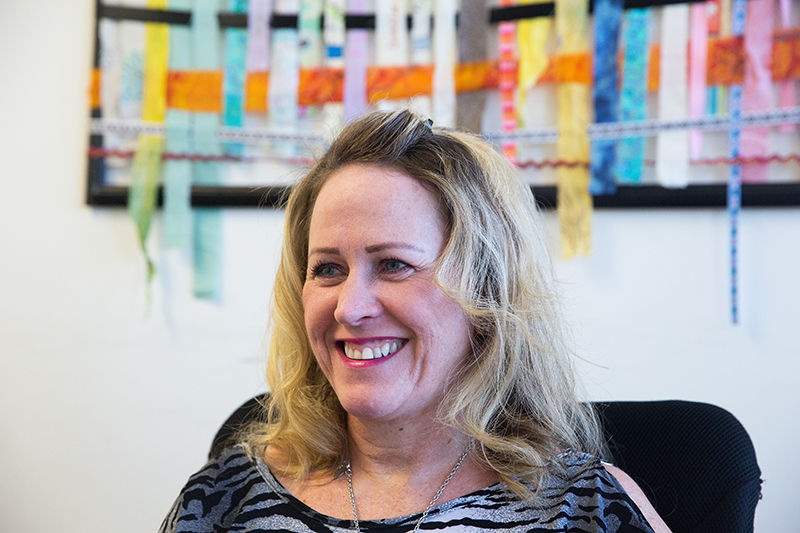By some reckoning, this will be the 60th Religious Education Congress organized by the Los Angeles Archdiocese. The annual event, known worldwide, draws upwards of 40,000 participants each year.
This year, Congress brings 199 speakers who will present 282 workshops, including 70 in Spanish and eight in Vietnamese. Youth Day sold out again this year, with around 15,000 young Catholics scheduled to attend the Thursday event featuring 30 workshops, thanks to the leadership of Christina Lamas.
Jan Pedroza, Congress program coordinator, said the annual event wouldn’t be possible without the hundreds of volunteers. Some have been volunteering for more than 40 years.
For years Paulette Smith, associate director of the Office of Religious Education and Congress event coordinator, along with Pedroza, have been leading much of the behind the scenes efforts to put on the largest religious education event of its kind in the world.
“There are countless volunteers, starting with Youth Day, that make this run smoothly,” Pedroza said, noting the volunteers on the registration, liturgy and Congress committees. “So many people tell us Congress is their retreat. The volunteers really help us welcome all of these people.”
Congress participants regularly hail from nearly every state in the nation, as well as from dozens of countries overseas. Serving these participants powers Congress organizers through long hours, often into the wee hours of the night.
“What sustains us is reflecting on the people who are attending and the experiences those folks have,” Smith said. “It’s their once-a-year shot in the arm. It’s all about creating an opportunity for people to have an encounter with Christ.”
The path to Smith’s role as associate director and co-coordinator of Congress began when she played guitar and sang at a folk Mass. The director of religious education at her parish asked her to get more involved.
Smith, a master catechist, eventually became a director of religious education herself before becoming the regional coordinator for the San Pedro Region. She became the associate director in 2006.
Pedroza, who converted to Catholicism when she was 22, worked in early childhood ministry before joining the Congress team in 2000. She had served for a time as a part-time director of religious education (DRE).
“No DRE job is part-time, and you can print that,” said Pedroza, who is also a master catechist.
“Being involved with Congress is one of the most rewarding jobs you can have in this archdiocese,” she added.
‘Boundless Mercy’
Each year, members of the Office of Religious Education meditate on the Sunday readings for the weekend of Congress to develop a theme. This year’s theme, “Boundless Mercy,” evolved from the Gospel reading of the woman at the well and pairs with the Jubilee Year of Mercy declared by Pope Francis. Artist Valerie McCray then takes on the difficult assignment of illustrating a theme.
“We look at contemporary issues and see how we can really be a Church that is aware of those issues and be connected,” Smith said. “We can really pay attention to the universality of the Church.”
That includes Congress’ “sacred space,” an area at the Anaheim Convention Center dedicated to an artistic expression of a contemporary issue. This year’s sacred space is dedicated to raising awareness of human trafficking.
This year’s keynote, Sister Helen Prejean, CSJ, will share the role that mercy plays in her mission of abolishing the death penalty.
While the Religious Education Congress has enjoyed decades of success, it hasn’t been without its detractors.
“We’re not trying to be controversial,” Smith said. “We don’t see it as controversy. What we see is the Church needing to be in dialogue. There’s a perception that at Congress, Church teaching is not promoted. And that’s false. So for any of these controversial issues, we always ensure that the Church’s teaching will be presented.”
Smith and Pedroza noted workshops on transgender issues, annulments and the death penalty as some that may generate “love and hate mail” this year.
“People who come to these workshops need to know they aren’t the only ones who have a son or daughter that is transgender or gay or lesbian,” Pedroza said. They can network and discover parishes that offer outreach for people who are gay or lesbian.
“We are all children of God, we’re all together,” she added. “We shouldn’t be distinguishing ourselves as divorced or gay or lesbian. But we do need to address the particular needs of these groups.”
Father Truc Nguyen will lead workshops in English and Vietnamese so that Congress-goers may better understand the Church’s annulment process. A session will also be offered in Spanish, led by Sister Karla Felix-Rivera, VDMF.
“We feel we’re doing the work that we’re called to, that Pope Francis is calling us to,” Smith said. “The Gospel is controversial. If people think we’re being radical because we have workshops on the death penalty, or transgender issues, or nullity of marriage, it’s just providing the Gospel message of Jesus, of acceptance and compassion and love.”
Smith and Pedroza have heard stories of Catholics who have lived in the archdiocese their entire life and have never heard of the Religious Education Congress. So while Congress draws more participants than any other event organized by the nation’s largest archdiocese, they aren’t satisfied.
“If we count 40,000, that’s less than one percent of the Catholics in our archdiocese,” Smith said. “So that’s a challenge. Congress is not just for religious educators, it’s for everybody. Faith formation is lifelong, and our responsibility as disciples is to continue to be enriched and Congress can do that for people, whether or not they’re catechists.”

